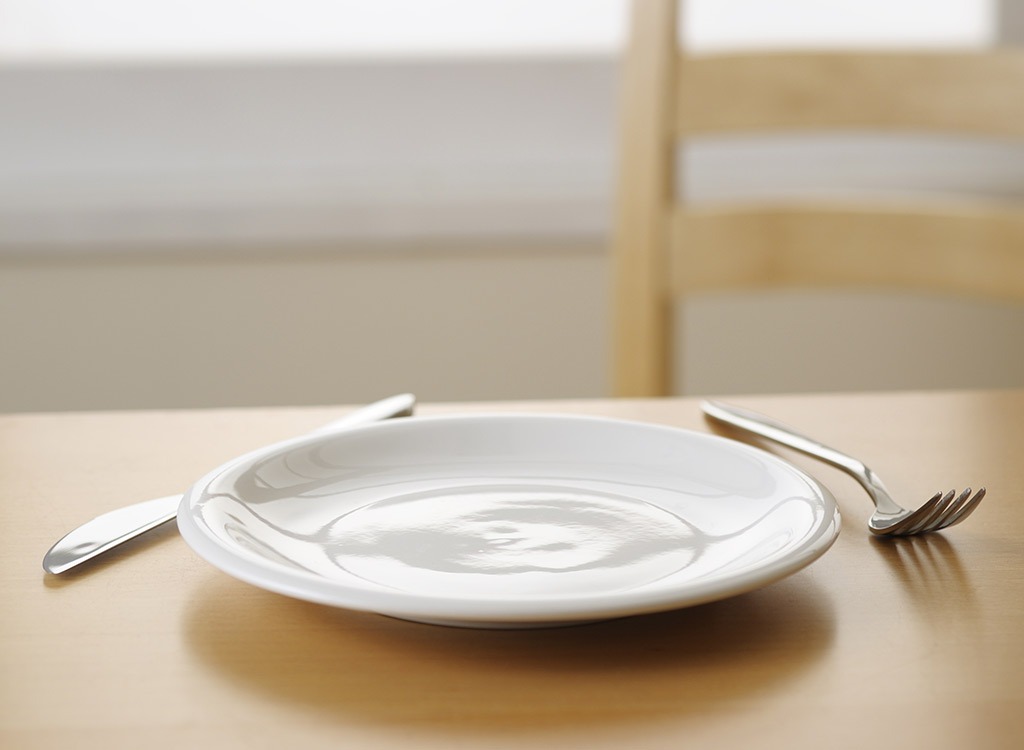6 Science-Backed Tricks To Lose 5% More Belly Fat

When you're working hard to lose belly fat, it's OK to be skeptical of simple solutions that sound too good to be true. But while people have been known to recommend some downright crazy things from skipping meals to cutting carbs completely, health and nutrition studies that are published in scholarly journals are the real deal. Before they're released to the public, they're peer-reviewed and upheld to a standard that you can rely on.
So when we tell you that all of the research below has found a way to decrease belly fat by at least 5%, you can trust us! And if you're still looking to blast that belly after trying these out, we've got other ways to help you lose that stubborn belly fat. And to make sure you're staying on course with your healthy eating goals, check out these 21 Best Healthy Cooking Hacks of All Time.
Reap The Rewards

Maybe the secret to finally overcoming your weight-loss plateau isn't push-ups or probiotics, but just cold hard cash. According to a study in Social Science and Medicine, selling a rewards program to weight watchers increased the amount and the duration of their loss. Those who paid for cash rewards, even if they didn't make their money back in the end, lost twice as much weight as those who hadn't. Not only did they decrease the number on the scale by 5%, but they were still holding onto these results a year into the program. The average payout for participants was $226. One way you can achieve similar results is to sign up for a DietBet with a few friends: you each donate some money, and whoever loses their goal amount of weight in a designated set of time gets a part of the profits!
Team Up

Struggling to slim down and lose belly fat this summer? Stop going at it alone. A study conducted by researchers at Brown University claims that weight loss can be contagious if positive peer pressure is involved. When 3,300 obese or overweight Rhode Islanders competed in 987 teams of 5-11 people to reach their weight loss goals, participants who lost at least 5% of their weight tended to be on the same team. And if team members were more active on social media, they were more likely to reach 20% loss. "Being surrounded by others with similar health goals all working to achieve the same thing may have really helped people with their weight loss efforts," says researcher Tricia Leahey, Ph.D. But if you're going to give a group effort a go, assign yourself the role of team captain. Whether it was due to increased motivation or engagement, people who led lost a greater percentage of weight.
Portion Perfectly

According to a study published in Obesity, you need prepackaged meal plans in your life. When people in behavioral counseling were given portion-controlled lunch and dinner entrees, they lost more weight than those eating a self-selected diet, reaching 8% loss on average. On top of that, participants in this group showed the most decreased risk of cardiovascular disease factors out of all 183 participants. Although the study doesn't include enough details on their dietary program to replicate it, you can easily start controlling your own portions at home.
Do It Write

Instead of picking up weights, pick up a pencil. A study published in the Journal of the Academy of Nutrition and Dietetics found that women who kept food journals lost about 6 pounds more than those who didn't. The 123 participants tested were all overweight or obese sedentary women of ages 50-75, all at a greater risk for weight gain as postmenopausal women, but they experienced up to 10% weight loss by the end of the study. "A food journal doesn't have to be anything fancy," says researcher Anne McTiernan, M.D., Ph.D. "Any notebook or pad of paper that is easily carried or an online program that can be accessed through a smartphone or tablet should work fine." For best results, make sure you're honest, accurate, and consistent as you log your meals.
Stop Skipping Meals

In the same study, researchers found that skipping meals could hinder weight loss results by about 8 pounds, plus won't help you lose that belly fat. Those who missed meals had a harder time slimming down, and McTiernan believes this has something to do with the tendency to respond to high-calorie foods after periods of fasting. Plus, depriving yourself of food can actually lead your body to hold onto fat because it thinks it's in starvation mode. So if you're hungry, don't hold back.
Looking for more helpful tips? Sign up for our newsletter to get daily recipes and food news in your inbox!
Eat In

Those same women who lost less weight because they skipped meals and weren't keeping food journals were also more likely to thwart their progress when they ate out. Just going to a restaurant once a week led to losing 5 fewer pounds, and while these results were observed for lunch in particular, eating out at all mealtimes produced a similar result. Researchers speculate that this has something to do with the lack of control when you're at a restaurant. You don't have much of a say over ingredients, cooking methods, or portion sizes. It's probably better if you choose to eat in, especially if you're making any of these 35 Healthy Chicken Recipes For Weight Loss.







